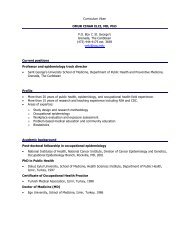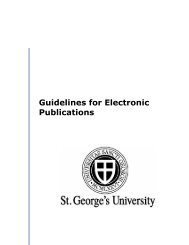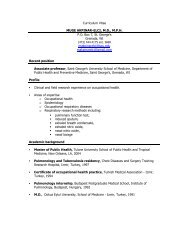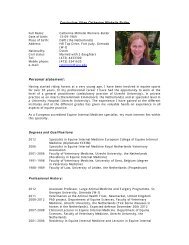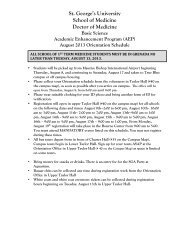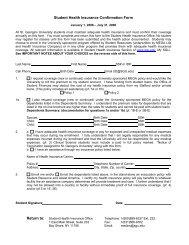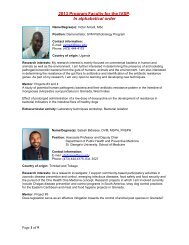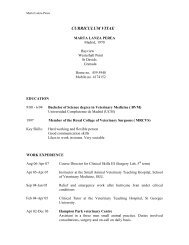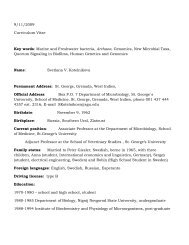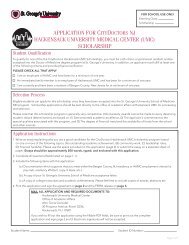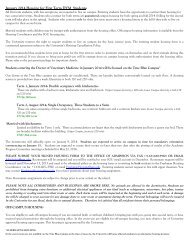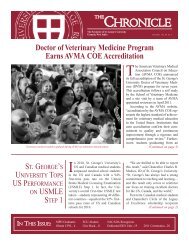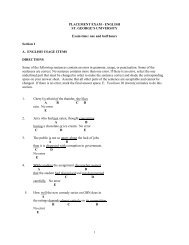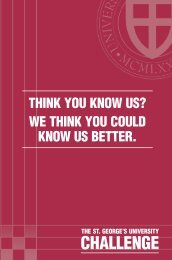SCHOOL OF 2012-2013 - St. George's University
SCHOOL OF 2012-2013 - St. George's University
SCHOOL OF 2012-2013 - St. George's University
You also want an ePaper? Increase the reach of your titles
YUMPU automatically turns print PDFs into web optimized ePapers that Google loves.
School of Medicine<br />
Course Descriptions<br />
students understand the basic principles of mechanics,<br />
heat, and sound.<br />
PHYS 202<br />
General Physics II<br />
This course is an introduction to basic principles of<br />
electricity, magnetism, electromagnetism, alternating<br />
current, electric fields, and optics. This course does not<br />
require mastery of calculus.<br />
PMED 301<br />
Learning <strong>St</strong>rategies for Preprofessional Programs<br />
This is a skills development course through which students<br />
in the preprofessional programs will find creative and<br />
constructive ways to gain and apply knowledge in learning<br />
situations. <strong>St</strong>udents will develop a commitment to learning in<br />
a more personalized, efficient, and effective way. Significant<br />
attention will be given to study strategies and how to best<br />
place these strategies into practice in their course of study.<br />
Class sessions will provide opportunities for students to gain<br />
exposure to various learning strategies and for students to<br />
share their experiences, successes, and concerns with other<br />
students. <strong>St</strong>udents will gain exposure to various learning<br />
techniques. <strong>St</strong>udents will be exposed to levels of learning,<br />
types of studying, time management and planning, active<br />
review, memory, note-taking strategies, group study, and<br />
methods of developing critical-thinking skills.<br />
PMED 302<br />
Communication for Health Professions I<br />
This course aims to develop students’ skills in locating,<br />
selecting, evaluating, and using research to answer<br />
questions, which are personally and professionally<br />
important. The course will help students to develop<br />
reading skills, to develop skills in paraphrasing and<br />
summarizing, and in using APA style to document sources.<br />
<strong>St</strong>udents will learn to evaluate research methods and will<br />
analyze structure and writing style in research articles.<br />
PMED 303<br />
Communication for Health Professions II<br />
This course aims to train students of the health professions<br />
to write clearly and effectively, to identify and correct<br />
punctuation and grammatical errors, and to write in style<br />
and registers that are appropriate for the academic and<br />
professional contexts. <strong>St</strong>udents will analyze several writing<br />
tasks commonly required in the health professions in order<br />
to identify and then apply the principles contributing to<br />
effectively performing these tasks. A process approach will<br />
be taken.<br />
PMED 380<br />
Clinical Cases<br />
This course is designed to introduce students in the final<br />
year of the premedical program to clinical medicine. It<br />
provides an insight into the knowledge, skills, attitudes,<br />
and values individual students need to acquire as<br />
physicians, as well as an understanding of how material<br />
currently taught in physiology lectures applies to clinical<br />
medicine.<br />
PMED 390<br />
Premedical Project Research<br />
This course is offered in the final year of the premedical<br />
program. It is a requirement for students in the School<br />
of Medicine combined degree program (Baccalaureate/<br />
MD). A focal point of the class is to equip students with<br />
the skills needed to assess, understand, and critically<br />
evaluate published medical research. The course begins by<br />
reviewing standard research design and common pitfalls.<br />
It then covers other relevant topics, such as methodology,<br />
ethics, online research resources, survey design, and basic<br />
data interpretation. <strong>St</strong>udents work together in small groups<br />
to produce a research paper and present a poster to the<br />
campus community.<br />
PSYC 201<br />
Introduction to Psychology<br />
Introduction to Psychology covers systematic and<br />
experimental approaches to understanding human<br />
behavior and cognition. The course is an in-depth<br />
introduction to the science and profession of psychology.<br />
It will present a summary of what is known about human<br />
nature, how it reveals general principles of the functioning<br />
of the brain, and the behavior of individuals and groups.<br />
PSYC 302<br />
Abnormal Psychology<br />
The course examines the etiology, epidemiology,<br />
description/classification, and treatment of disordered<br />
behavior. Major mental disorders are systematically<br />
examined from several different theoretical viewpoints,<br />
including psychodynamic, learning, cognitive, physiological,<br />
and humanistic/existential. A survey of psychological<br />
disorders is provided and students are introduced to the<br />
DSM-IV classification system. Treatment approaches based<br />
56 | <strong>St</strong>. George’s <strong>University</strong>



